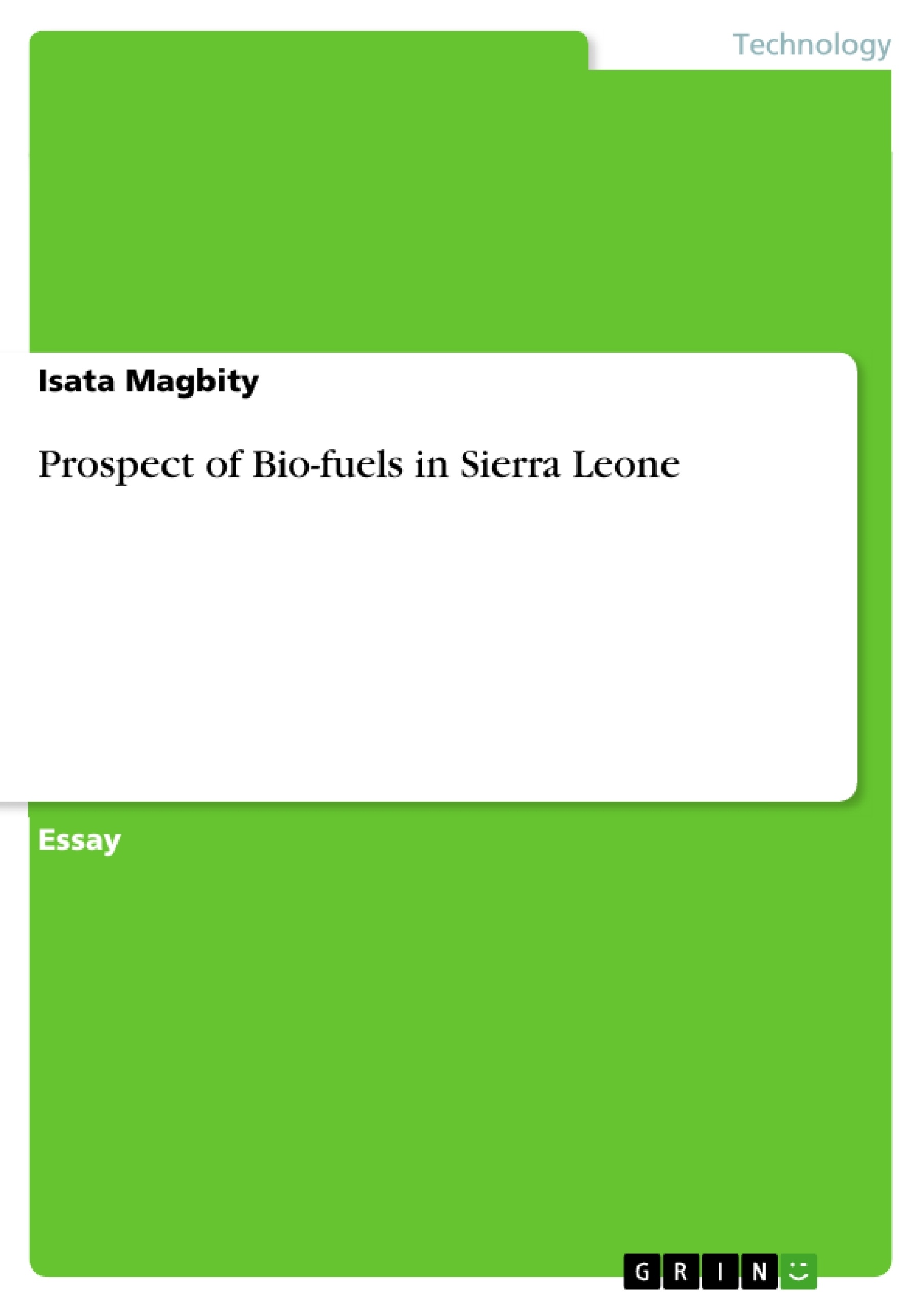Sierra Leone is a major location for tropical plants such as cassava, palm oil and sugarcane. Its favourable weather conditions, plentiful supply of resources, large arable lands and assets to irrigation assets make it an ideal location for biofuel investment. The potential market for biofuel within the country is extremely small due to the costs of biodiesel and the lack of Government incentives; however its location on the coast of Africa and its vicinity to Western and African countries means offsets this drawback. The most suitable location for an ethanol plant in Sierra Leone is Kambia and for biodiesel production the ideal locations are Pujehun and Kenema. The proposed processing route for the production of cane sugar is fermentation. The recommended process for biodiesel production is an enzymatic transesterification process. This method is adopted to minimize the environmental impact of production. Nevertheless there are still several environmental concerns that arise during the production of biofuels. The most important of these are food security issues. Although the paper concludes that prospects for biofuels are large in Sierra Leone, investors must adopt an emergent strategy to minimise the risks.
Inhaltsverzeichnis (Table of Contents)
- Executive Summary
- Introduction
- Biofuel Resources
- Government Policy and Incentives
- Market Opportunities
- Location and Size of Plant
- Processing Routes
- Environmental and Social Issues
Zielsetzung und Themenschwerpunkte (Objectives and Key Themes)
This essay explores the prospects for biofuels in Sierra Leone, focusing on their potential to contribute to energy security, economic growth, and rural development. It examines key factors influencing the viability of biofuel production in the country, including resource availability, government policies, market demand, plant location and size, processing methods, and environmental and social considerations.
- Potential of Biofuels for Energy Security and Economic Growth
- Resource Availability and Suitability of Feedstocks
- Government Policies and Incentives for Biofuel Investment
- Market Demand for Biofuels in Sierra Leone and Regional Markets
- Environmental and Social Impacts of Biofuel Production
Zusammenfassung der Kapitel (Chapter Summaries)
This essay analyzes the potential of biofuels in Sierra Leone, exploring the country's resources, government policies, market opportunities, and the challenges and benefits of biofuel production. It provides a comprehensive overview of the factors influencing the viability of biofuel investments in the country, including resource availability, feedstock options, processing methods, and environmental considerations.
Schlüsselwörter (Keywords)
Biofuels, Sierra Leone, energy security, economic growth, resource availability, government policies, market demand, processing routes, environmental impact, food security, investment opportunities.
Frequently Asked Questions
Why is Sierra Leone considered an ideal location for biofuel investment?
Sierra Leone offers tropical weather conditions, a plentiful supply of resources like cassava, palm oil, and sugarcane, large arable lands, and access to irrigation.
Where are the best locations for biofuel plants in Sierra Leone?
Kambia is identified as the most suitable location for an ethanol plant, while Pujehun and Kenema are ideal for biodiesel production.
What are the main environmental concerns regarding biofuel production?
The most significant concerns include food security issues (competition between fuel and food crops) and the environmental impact of processing methods.
What processing methods are recommended for biofuels in Sierra Leone?
Fermentation is proposed for cane sugar ethanol, while an enzymatic transesterification process is recommended for biodiesel to minimize environmental impact.
What are the market opportunities for biofuels in the region?
While the domestic market is small due to high costs, Sierra Leone's coastal location provides easy access to Western and other African export markets.
- Citation du texte
- Isata Magbity (Auteur), 2013, Prospect of Bio-fuels in Sierra Leone, Munich, GRIN Verlag, https://www.grin.com/document/230290



